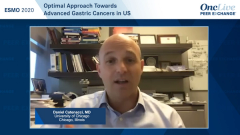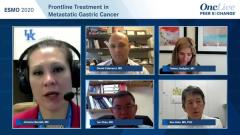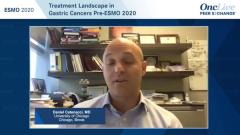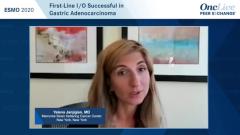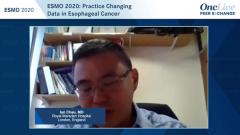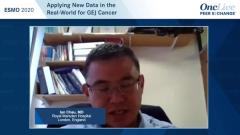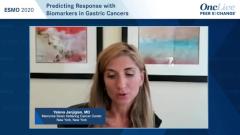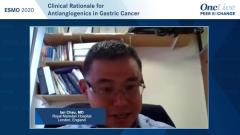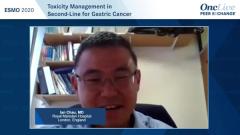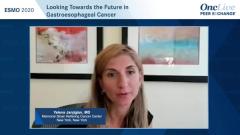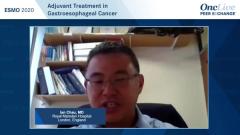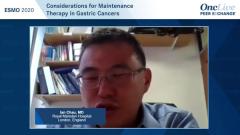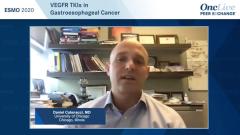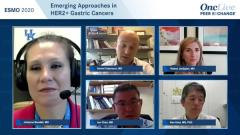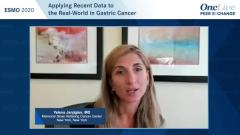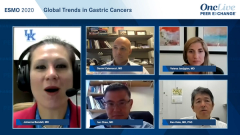
First-Line I/O Successful in Gastric Adenocarcinoma
Episodes in this series

Transcript:
Johanna Bendell, MD: Yelena, it’s almost like we could title it a movie: What happened yesterday? I know what you did yesterday at ESMO [European Society for Medical Oncology Congress]. What in the world happened?
Yelena Janjigian, MD: ESMO this year was really exciting for our group. As you can see, we’re all a very tightly knit group of upper gastrointestinal doctors, and it was a success. We had 4 oral presentations at the plenary session. It’s their version of the plenary session, and you can change with just that 1 day the way that we think about both esophagus and gastric cancer. There were 2 practice-changing abstracts in adenocarcinoma of esophagogastric, and that’s the CheckMate649. Certainly, adjuvant therapy has been changed as well. I agree with everything that’s been said so far about their Kaplan-Meier curves in first-line setting.
What is exciting about immunotherapy is that there’s always a plateau. What’s frustrating, at least in first-line setting, is that in the beginning, in the first 6 to 9 months, chemotherapy has always been at the top. Even though immunotherapy eventually reaches a plateau, the curves do cross in the beginning, suggesting that in some patients, there’s a detrimental effect if you avoid chemotherapy in first-line setting.
We can talk about the issues with KEYNOTE-062, but despite previous attempts, there has not been a study that’s demonstrated that immunotherapy is helpful in first-line setting until CheckMate649. We saw the data that Markus Moehler presented yesterday, and they will be in publication form very soon.
What’s refreshing about the study is that for the first time—unlike previous studies, where esophagus adenocarcinoma and squamous were grouped together—with CheckMate649, esophageal adenocarcinomas are together with GE [gastroesophageal] junction and stomach adenocarcinomas. We know biologically through TCGA, the Cancer Genome Atlas analysis, that adenocarcinomas of the esophagus are very similar to GE-junction adenocarcinomas, and they’re nothing like esophageal squamous cancer. Trials in which adenocarcinomas are grouped with squamous cell cancers should be an antiquity, and we should not be designing those studies anymore.
For CheckMate649, another refreshing approach is the real-world chemotherapy backbone that was used, FOLFOX [5-fluorouracil, leucovorin calcium, oxaliplatin]. As you heard from Dan Catenacci, myself, and Ken Kato, and I’m sure Ian Chau could chime-in as well, no one is using cisplatin, and certainly not at 60 or 80 mg/m2. Once again, it’s a refreshing approach, and a real-world backbone therapy. Our pharma partners certainly listened while we mandated this design.
For these reasons, it was a large, well-designed study—and we can talk about the subgroup and biomarker analysis—designed to look for a CPS [combined positive score] PD-L1 greater than or equal to 5. The overall survival [OS], progression-free survival [PFS], and the primary end points were met.
In second- and third-line therapy in the United States, the West, and China, where the majority of the patients were enrolled, very few people get immunotherapy in the second- and third-line setting; that’s probably 1 of the reasons why the overall survival benefit was so robust and was clearly seen. Unlike in ATTRACTION-4, which was another reassuring and practice-changing study presented. Although the PFS end point was clearly met, the overall survival end point was not met.
If you look at the data, the median overall survival for those patients was 17 months, but in CheckMate649, we’re all patting one another on the back because we cleared the 1-year mark. You know the median overall survival in the experimental arm in CPS-greater-than-5 category was 14, which is great but not as good as 17, which was what was seen in ATTRACTION-4. In my mind, that raises a question. In Japan and Korea, so many patients get I/O [immuno-oncology] in second- and third-line setting; it is approved in that. Plus, a percentage of patients get second- and third-line therapy in general. Are there more patients with gastric cancer in Japan than with colon cancer in the United States? Is OS benefit even needed? Can we design trials based on PFS? We can see clearly that ATTRACTION-4 met the PFS end point.
Nonetheless, both CheckMate649 and ATTRACTION-4 show that immunotherapy can be used in the first-line setting. It’s safe; it’s tolerable. Oxaliplatin is the new standard for design of next-generation studies. This should be a clear end of cisplatin-based backbone; the FDA set precedent. You hear about these discussions behind closed doors. You know the companies are worried that cisplatin is the standard—that’s the trial design that’s mandated. But that’s not the case. Let’s please stop using cisplatin. I’m sure Ken has comments regarding ATTRACTION-4. I’d be curious to hear what his thoughts are about PFS and OS.
Transcript Edited for Clarity


